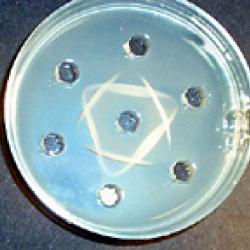Source Institutions
Source Institutions
Add to list Go to activity
Activity link broken? See if it's at the internet archive

In this biology activity, learners use plastic pipettes to cut wells into the solid gel layer of agar in petri dishes and place solutions of simulated antigen and antibody preparations into the wells. The antigens and antibodies diffuse into the gel layer and react to form a precipitate. This activity demonstrates the biological phenomenon of the formation of a precipitate when an antigen reacts with an antibody. The exercise can be used to illustrate the specificity of antigen-antibody reactions, showing that a precipitation reaction only occurs when an antibody reacts with the antigen that was used to induce the formation of the antibody. The exercise is also a general demonstration of diffusion. Adult supervision is recommended.
- 1 to 2 hours
- 45 to 60 minutes
- Over $20 per group of students
- Ages 14 - 18
- Activity, Experiment/Lab Activity, Lesson/Lesson Plan, Simulation
- English
Quick Guide
Materials List (per group of students)
- Agar or agarose plates with wells
- La+++ solution (lanthanum nitrate, 1 M)
- F- solution (potassium fluoride, 1 M)
- Ag+ solution (silver nitrate, 0.2 M)
- Cl- solution (sodium chloride 0.4 M)
- Cl- diluted solution (sodium chloride 0.1 M)
- 60 mm plastic petri plates
- Disposable Graduated Small or Large Bulb 1 ml plastic pipettes, with the first and second gradations cut off (used for cutting the wells)
- Pasteur pipettes (or other narrow tipped pipettes; used for filling the wells)
- Microwave oven (or bunsen burner or hot plate)
- 250- or 300-ml flask
- Distilled water
Subjects
-
Life Sciences
- Cells
-
Human Body
- Immune System
-
Physical Sciences
-
Chemistry
- Chemical Reactions
-
Structure and Properties of Matter
- Elementary Particles and Nuclear Physics
-
Chemistry
-
The Nature of Science
-
The Scientific Process
- Conducting Investigations
-
The Scientific Process
Audience
To use this activity, learners need to:
- see
- read
- touch
Learning styles supported:
- Involves hands-on or lab activities
Other
Components that are part of this resource:
- Purpose and Background Information
- Materials and Methods
- Lesson Plan
- Supplemental Information and References
This resource is part of:
Access Rights:
- Free access
By:
- Schadler, Daniel
Rights:
- All rights reserved, The American Phytopathological Society, 2011
